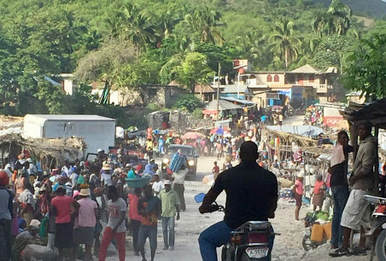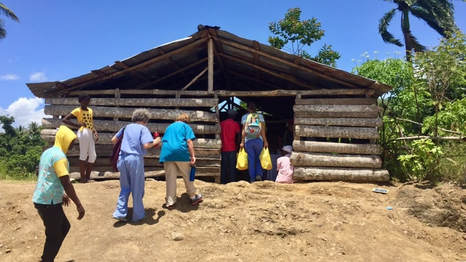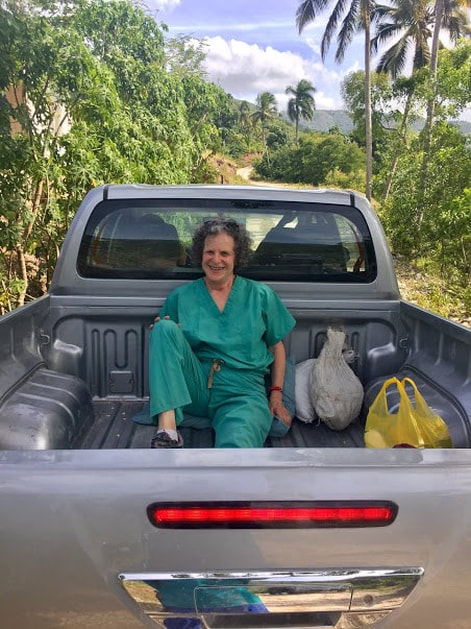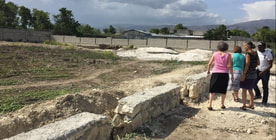
BEARING WITNESS
IS NO SMALL THING:
A NURSE’S PLUNGE
IN PORT-AU-PRINCE, HAITI
by Diane Berg, June, 2018
I am back in Haiti. I didn’t expect to be here again so soon. What has compelled me to return after only two months? I am greeted at the airport by the gauntlet of hundreds of men desperate for work and by a heat that is even more relentless than during my last trip. Is that even possible?
I had been recruited several months earlier by someone who was looking for a nurse-midwife to train “matrons” in helping women to give birth safely. I am remembering those five days spent with twenty-five women and men who had little or no formal training and many of whom were illiterate. Most women in Haiti give birth at home under unimaginable conditions and without any access to hospital care. Hospitals cost money they simply don’t have. Most Haitians do not have the money to buy enough food.
The training included the most basic information about hygiene and nutrition and emphasized how to attempt to deal with various obstetric emergencies at home. The matrons were warm and welcoming, famished for information because most Haitians receive little education. In Haiti, you have to pay to attend school.

The matrons began each morning with a prayer and a song, moving in its intensity. I heard later from our translator that they got a kick out of watching me sway and clap to their music. They laughed easily, especially over our goofy antics when my nurse partner (Alison) and I roleplayed how to handle obstetric emergencies. This richness of spirit was juxtaposed with the reality that while the maneuvers we taught might occasionally help, many mothers and babies will die unnecessarily in childbirth without access to medical backup. “Whatisthis?” I wondered, trying to make sense of this intensely jarring experience.
On this second trip, I would not do any training but would spend all my time seeing patients. Upon arriving at the Partners in Development (PID) compound in Port-Au-Prince with the other members of our team -- two nurses (one – Nancy - a retired nurse from my Sangha) and a pre-med student – I was put to work counting out two-month supplies of medications. I recall that “Dorothy, you’re not in Kansas anymore” moment on my last trip when I was greeted by the same ten and twelve-year old girls doing this task that is performed in the U.S. by pharmacists. I remember at that moment thinking that the three tenets would serve me well in Haiti, that it would be important for me to suspend all expectations and judgments, and to simply bear witness to whatever presented itself in this place so different from anywhere else I’d ever been.
On this second trip, I would not do any training but would spend all my time seeing patients. Upon arriving at the Partners in Development (PID) compound in Port-Au-Prince with the other members of our team -- two nurses (one – Nancy - a retired nurse from my Sangha) and a pre-med student – I was put to work counting out two-month supplies of medications. I recall that “Dorothy, you’re not in Kansas anymore” moment on my last trip when I was greeted by the same ten and twelve-year old girls doing this task that is performed in the U.S. by pharmacists. I remember at that moment thinking that the three tenets would serve me well in Haiti, that it would be important for me to suspend all expectations and judgments, and to simply bear witness to whatever presented itself in this place so different from anywhere else I’d ever been.

The next day we travel to a town in the southern part of Haiti that will serve as our base for the following three days. We set up a clinic in a tiny church with a rusted tin roof in an isolated mountain village. To get there, we travel in pickup trucks on rutted, rocky paths that pass for roads and cross two rivers. On my previous trip, we had to cut the clinic short when the water began to rise in one of the rivers after a torrential rainstorm. Our driver warned that we would soon be unable to cross the river by truck if we waited any longer. And in fact, when we crossed the river, there was a terrifying but thankfully brief moment when the truck’s tires were no longer in contact with the river bed and the truck was afloat…no expectations, no judgment…)
Due to their isolation and poverty, most of the people in the area had never seen a health care provider until PID began this mobile clinic after the hurricane last fall that devastated parts of Southern Haiti. Among a myriad of health problems, it was discovered that about 40% of the people in the area suffer from moderate to severe hypertension (some with absurdly high blood pressures) and because they have received no treatment, a number of people had had strokes.
Due to their isolation and poverty, most of the people in the area had never seen a health care provider until PID began this mobile clinic after the hurricane last fall that devastated parts of Southern Haiti. Among a myriad of health problems, it was discovered that about 40% of the people in the area suffer from moderate to severe hypertension (some with absurdly high blood pressures) and because they have received no treatment, a number of people had had strokes.

Diane Berg has been a nurse-midwife for most of her career. She recently worked as a hospice nurse. She practices with Sensei Eve Marko at the Green River Zen Center in Western Massachusetts. She can be reached by email at dianeberg7@ gmail.com. Please contact her if you are interested in getting involved in work in Haiti. You can make a donation to the Haiti Homeless Shelter Project through Partners In Development, 174 High Street, Ipswich, MA 01938 (or online at: https://www.pidonline.org/donate/online) and indicate that funds are to be used for this specific project.

